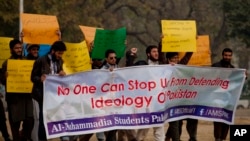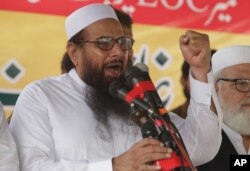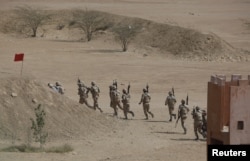U.S. counterterrorism authorities are growing increasingly concerned about the activities of the student branch of a banned Pakistani militant organization that's seen as a threat to regional and U.S. interests.
The State Department this week announced it was adding the student wing of Lashkar-e-Taiba (LeT) to its list of foreign terrorist organizations.
The move against the student group, Al-Muhammadia Students (AMS), came as the U.S. Treasury Department added two LeT leaders to the U.S. list of specially designated global terrorists, subjecting them to sanctions that bar Americans from doing business with them.
"AMS is a subsidiary of LeT and has worked with LeT senior leaders to organize recruiting courses and other activities for youth," the State Department said in a statement.
LeT, or the Army of the Pure, is one of the largest and most virulent anti-India terrorist groups in Pakistan. It has been accused of orchestrating numerous attacks, including a 2008 assault in India's Mumbai that killed 166 people, including six U.S. citizens.
Operates through fronts
The U.S. designated LeT as a foreign terrorist organization in December 2001. It has repeatedly changed its name and continued operating through front organizations. After the U.S. designation, LeT changed its name to Jamaat-ud-Dawa (JUD) and began humanitarian projects in an attempt to circumvent restrictions from sanctions.
A predominantly Punjab-based group, LeT was formed in the late 1980s and has conducted operations against Indian troops and civilian targets in Kashmir, several high-profile attacks inside India, and operations against Western coalition forces in Afghanistan, according to a State Department report.
LeT's student wing and its several charitable organizations are trying to mask its terror activities by posing as reputable aid groups, according to Pakistani analysts. They provide emergency and humanitarian assistance during natural disasters.
"They are attempting to create a parallel system to the civil society by replacing NGOs, human rights groups and humanitarian organizations in Pakistan," Karachi-based journalist Ali Arqam, who covers security affairs, told VOA.
Militant organizations like LeT have an active presence in educational institutions across Pakistan as they seek to influence street politics by recruiting youths into their ranks.
Groups like LeT's student wing recruit new members and distribute literature at universities, and their student organizations hold regular meetings and discuss their on-campus activities. They often organize rallies and sit-ins.
"Just recently, [LeT's student wing] had a large gathering at a university in Jamshoro," Arqam said.
Diplomatic isolation
As militant groups continue to flourish in Pakistan, the government is facing threats of increasing diplomatic isolation from some U.S. lawmakers over its inability to curb homegrown militancy and the threat it poses to its neighbors.
And experts say the U.S. move on the student wing indicates that it remains concerned about the continued presence of extremist groups in Pakistan that threaten the stability of the region and beyond.
"The U.S. decision to designate a wing of LeT as a foreign terrorist organization is meant to put more pressure on Pakistan to take action against this group," said Michael Kugelman, a South Asia specialist at the Woodrow Wilson Center in Washington.
"Washington has frequently pushed Pakistan to do more to bring LeT suspects to justice, and this has a lot to do with the fact that Americans have been directly targeted by the group," he said, referring to the six Americans killed in the Mumbai attack.
Analysts say the U.S. move may push Pakistan to act more aggressively against terrorist organizations.
"The decision is significant in a way that the U.S. wants to increase pressure on Pakistan, and especially when Donald Trump takes over as president, he will increase the pressure more to act against such organizations," Pakistan-based security affairs Hassan Askari told VOA's Deewa service.
Dismissed as theater
Pakistan accuses U.S. lawmakers of diplomatic theater, saying the harsh anti-Pakistani rhetoric belies that government's efforts to root out extremism. Pakistani officials also say thousands of Pakistani lives have been lost in terror attacks.
But Islamabad's counterterrorism measures have widely been criticized by many Pakistani politicians who say the government has failed to formulate a counternarrative to extremism and terrorism.
"Among the range of legislative and administrative measures aimed at curbing terrorism, only the creation of military courts was fully implemented," veteran Pashtun politician Afrasiab Khattak said in an opinion piece for Radio Free Europe.
"Reforms in religious schools, preventing banned organizations from opening shops under new names, mainstreaming the northeastern tribal areas, and security sweeps against militants in the eastern province of Punjab were put on the back burner."






